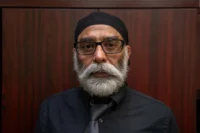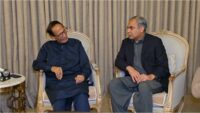Stockholm, Sept 26 (AFP/APP):At the 1992 Earth Summit in Rio, 12-year-old Severn Cullis-Suzuki urged the world to save the planet. Now, the Canadian is a fervent supporter of Greta Thunberg, a “powerful” force who’s holding world leaders to account.
“I’m only a child and I don’t have all the solutions, but I want you to realise, neither do you!” Cullis-Suzuki told heads of state and government in the Brazilian city, adding: “If you don’t know how to fix it, please stop breaking it!”
Twenty-seven years later, her words could be those of Greta, the young Swedish climate activist who took the podium at the UN on Monday and accused world leaders of having “stolen (her) dreams and (her) childhood with (their) empty promises”, for the sake of “fairy tales of eternal economic growth.”
Has anything changed in the years between Rio and New York?
“Why were the next decades the most destructive? It’s about governance. Why do we do all these agreements, and not apply them?” asks Cullis-Suzuki in a phone interview with AFP.
She lives in Haida Gwaii, off British Columbia’s coast where she lives with her husband, a member of the indigenous Haida community, and their two sons.
“Now we have climate change that very much affects everyone, and we don’t have the time to wait another generation,” the 39-year-old warns.
Cullis-Suzuki attributes the personal attacks on Greta Thunberg, a 16-year-old with Asperger’s syndrome, to the fact that adults feel threatened by a child holding them accountable.
“She’s powerful. She’s shaming these leaders. And as she’s calling for a revolution, of course she’s getting pushback. They try to silence her,” she says.
“She’s a 16-year-old child who says: The emperor has no clothes.”
“This young girl whom people are making fun of her appearance… I hope she has spiritual and personal support.”
After Rio, Cullis-Suzuki joined the commission of the Earth Charter, an international declaration of fundamental values aimed at “building a just, sustainable, and peaceful global society in the 21st century.”
She went on to study ecology, evolutionary biology and ethnobotany, and advised former UN secretary general Kofi Annan at the World Summit on Sustainable Development in Johannesburg in 2002.






